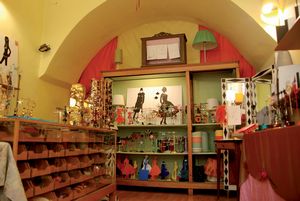The key to a successful study abroad experience is being able to use your imagination. You have to imagine that you aren’t here for just six months, four months, or five weeks. You have to arrive having convinced yourself that this is where you live. Not where you ‘are living for a semester’ or where you ‘will be studying for a while,’ but that this is your home. It’s a shift in thinking, one that requires a substantial amount of imagination, one that produces incredible results.
A good way to prepare for study abroad is to listen to others who have been abroad before and what they wish they had done. Probably the most common retrospective desire is ‘I wish I had been more involved in the Italian community.’ Becoming involved in a new community is always challenging, no matter how you slice it, and especially so while trying to decipher a new language and a new set of social customs. But with a little (ok, a lot) of imagination, it is possible to become a part of the local community.
To become involved you cannot listen the voice that says, ‘I’m only here for four months, so it’s not really worth it’. Meeting a group of locals outside of your campus or a bar is always worth it. Think about what you do at home, the activities and hobbies that are an integral part of your life. For example, I devote a huge amount of my time to taking dance classes and tutoring. If my study abroad site were where I lived permanently, I would need to find a dance studio and a school that cooperates with tutors. So, I found them. Taking dance class was a great way to become accustomed to the Italian language. Ballet uses an international vocabulary, and after a day of being frustrated by things that should be simple, like buying coffee and taking the bus, it was a great relief to walk into the studio where I knew what I was supposed to do. It was fun and comfortable.
Tutoring was, however, a challenge and took me very far from my comfort zone. I was placed in a third-year high school English class. Most of the students were my age, having repeated several years of school, and were not particularly interested in, or capable of, speaking English. The teacher sat back and let me take a stab at reining in the class and trying to get the students to capire some of my American English. Every minute was straining, and I used every ounce of my imagination trying to communicate with the students. By my last class, however, I had left, if nothing else, a concrete, real example of an American who was interested in Italian culture and who had come to Florence for more than just the chance to drink without being carded.
There is a large presence of American students in Italy, and, unfortunately, we are all stuck in the category of ‘loud, lewd, drunk American.’ Not only is volunteering an excellent way to become involved, but it is an excellent opportunity to help refute this stereotype. I was fortunate enough to have a well-established community service program at my study abroad site. If your campus does not offer such a service, think about participating through another university, or, better yet, launching a program at your campus.
When you study abroad, everything is new, and it is therefore the perfect opportunity to do something you’ve never done, to try something completely new. Become involved, and, at the same time, stretch your comfort zone by trying something that you’ve always wanted to but never have. For example, I’ve always wanted to write for my university’s student newspaper, but I just never got around to actually doing it. In Florence, I enjoyed reading The Florentine, so I decided to write for it.
Pay attention to flyers and ads: there are always notices about classes in painting, drawing, photography. Every city has various organizations and groups that cater to specific interests. Join the local hiking club and you’ll find people who like to do the same things as you.
Think you have no particular skills? Then just go see what others are doing. Being an appreciative audience member is as important as being a performer. Florence’s prime example of this is Creative Campus, a collaborative group that pools the talents of students from study abroad sites across the city. Musicians, singers, photographers and other performers present several ‘nights of entertainment’ during the semester.
One evening’s performance featured Natasha and her flaming hula hoop. Now, this is something I will never do, no matter how big my comfort zone gets, but I could certainly watch with a gaping jaw and clap ferociously when she took her bow without even a singe. Going to such events is also a great way to meet people-other study abroad students as well as locals.





